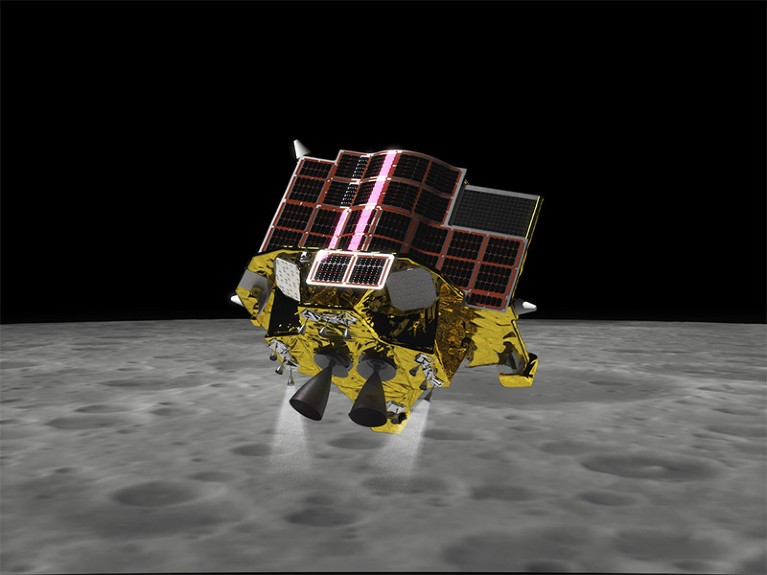Hello Nature readers, would you like to get this Briefing in your inbox free every day? Sign up here.

Artist’s impression of the SLIM spacecraft coming in for landing on the Moon.Credit: JAXA
Japan has become the fifth country to land a spacecraft on the Moon, using imaging technology that allowed it to touch down within 100 metres of its target site. It seems that the craft has set a new record for precision landing — but problems with using its solar panels to generate power means the spacecraft may have survived just a few hours. Now that both India and Japan have succeeded at soft lunar landings, they are planning a joint mission to the south pole region to look for frozen water.
Nature | 5 min read
The World Health Organization (WHO) warns that developing and deploying healthcare AI mustn’t be left to tech companies and those in wealthy countries. This could lead to a “race to the bottom” in which firms seek to be the first to release applications, even if they are dangerous or useless. The WHO’s new guidelines on large multi-modal models recommend, among other things, mandatory audits of medical algorithms to ensure they protect both data and human rights.
Nature | 4 min read
Reference: WHO report
Changes to visa rules that affect postdocs and lab technicians in the United Kingdom “create a real risk that the UK is seen as a less attractive place for the world’s brightest and best students and researchers,” says Daniel Rathbone of the science-advocacy group Campaign for Science and Engineering. Visa fees and healthcare charges will rise, and new foreign undergraduates won’t be permitted to bring their families with them. Low postdoc salaries mean that many might not earn enough to qualify for visas at all.
Nature | 5 min read
Dogs might wag their tails because the humans who domesticated them tens of thousands of years ago liked the rhythmic movement. Wolves also wag their tails, but even those that have been hand-reared seem to do so less often than dogs. “We put forth a new hypothesis that humans consciously or unconsciously selected for tail wagging during the domestication process,” says bioacoustics researcher Silvia Leonetti. Another possibility is that wagging arose as a byproduct of selection for other traits, such as a tame and docile character.
The Guardian | 3 min read
Reference: Biology Letters perspective
Features & opinion
Table of Contents
The technologies that Nature will be watching this year include protein design using algorithms similar to those underlying image-generators such as DALL-E, deepfake-detection tools and gene-editing systems that can modify DNA sequences much larger than the single-site edits possible with regular CRISPR–Cas. One advance that didn’t make the cut: ChatGPT. Its applications are “labour-saving gains rather than transformations of the research process”, says the feature.
Nature | 15 min read
“We recognized a growing need for professional and emotional support among our peers that we felt was not being met by our institution,” writes immunologist Taylor Tibbs, who notes that anxiety and depression affect nearly half of all early-career researchers. The support network she co-founded allows graduate students and postdocs to share their concerns and celebrate successes. “Realizing that you are not the only one struggling is empowering,” said one member. “We help build each other up.”
Nature | 7 min read
Many researchers are keen on the idea of open science, but aren’t sure how to share research plans, protocols, materials, data and papers through open-access platforms. But five simple steps could help:
• Check local guidelines whether sharing is mandatory
• Decide with collaborators whether and what to share from the outset
• Start early to minimize the time and effort involved
• Track who has access to your materials
• Report sharing in grants and research plans
Nature | 9 min read
Last week, Leif Penguinson was hiding in the old growth forest of Congaree National Park, South Carolina. Did you find the penguin? When you’re ready, here’s the answer.
Thanks for reading,
Flora Graham, senior editor, Nature Briefing
With contributions by Katrina Krämer and Sarah Tomlin
Want more? Sign up to our other free Nature Briefing newsletters:
• Nature Briefing: Anthropocene — climate change, biodiversity, sustainability and geoengineering
• Nature Briefing: AI & Robotics — 100% written by humans, of course
• Nature Briefing: Cancer — a weekly newsletter written with cancer researchers in mind
• Nature Briefing: Translational Research covers biotechnology, drug discovery and pharma
